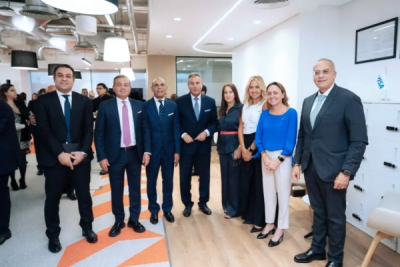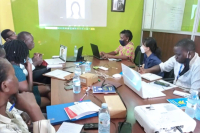With the ongoing digital transformation, investments are pouring into Africa to guarantee quality internet connection for populations. Over the past three years, new telecoms infrastructures have been commissioned for this purpose.
Demand for high-speed Internet services in Africa has been rising since 2020. This need is currently having a direct impact on the continent's transmission capacity, which has recorded the fastest compound annual growth rate (CAGR) in the world over the past three years, indicates the Broadband Commission of the International Telecommunication Union (ITU), in its report "The State of Broadband 2023 Digital Connectivity: A Transformative Opportunity."
Between 2020 and 2023, a dozen new submarine cable systems were commissioned on the continent, boosting total available bandwidth by more than 70 terabits. In addition to cables such as the South Atlantic Inter Link, Orval, METISS, DARE1, EllaLink, Maroc Telecom West Africa, Equiano, 2Africa, etc., thousands of kilometers of terrestrial fiber optic cable have also been deployed by suppliers such as Liquid Telecom. Added to this are the data capacities of national and international satellite communication systems such as Eutelsat, YahClick, Intelsat, Starlink, OneWeb, etc.
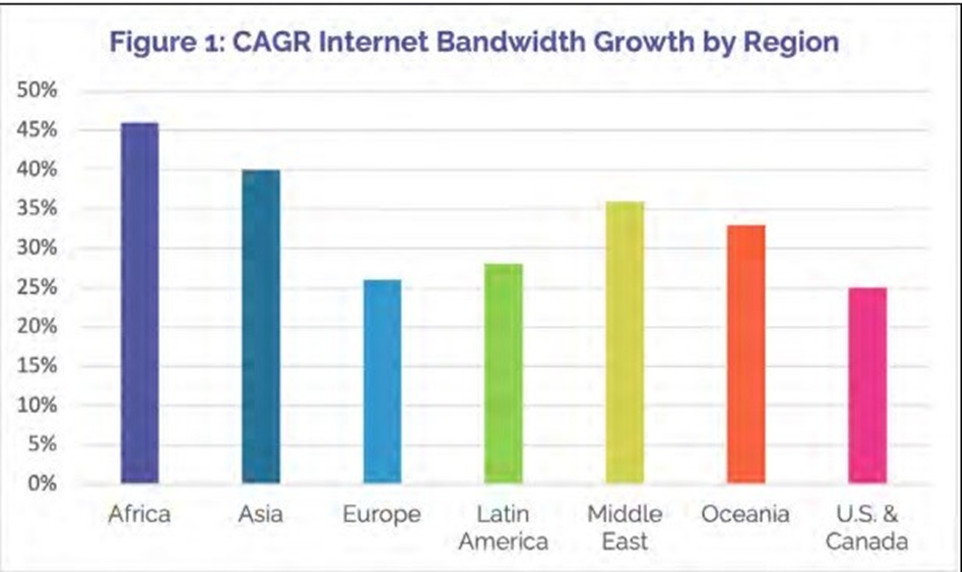
Source: Broadband Commission
In its June 2020 Mobility Report, tech company Ericsson reported that in sub-Saharan Africa, home to more than half the African population, monthly internet trafic per smartphone was 1.9 gigabytes in 2019. By June 2022, this monthly traffic had climbed to 4.7 gigabytes. Ericsson estimates that this growth in demand volume will reach 19 GB by 2028, for individual consumers alone. However, the rapid annual growth in high-speed transmission capacity does not always benefit all African populations, even though 83% of them are covered by a telecoms network (49% by 4G and almost 30% by 3G), according to the ITU. The Internet access rate is only 33% (87% in Europe, 81% in the USA, 61% in Asia-Pacific), despite the significant potential for high-speed connectivity. A number of obstacles are still holding back the full exploitation of the various Internet investments made by governments and service providers. These include the high cost of entry-level broadband services. They are still well above the threshold set by the Broadband Commission: less than 2% of monthly gross national income per capita.
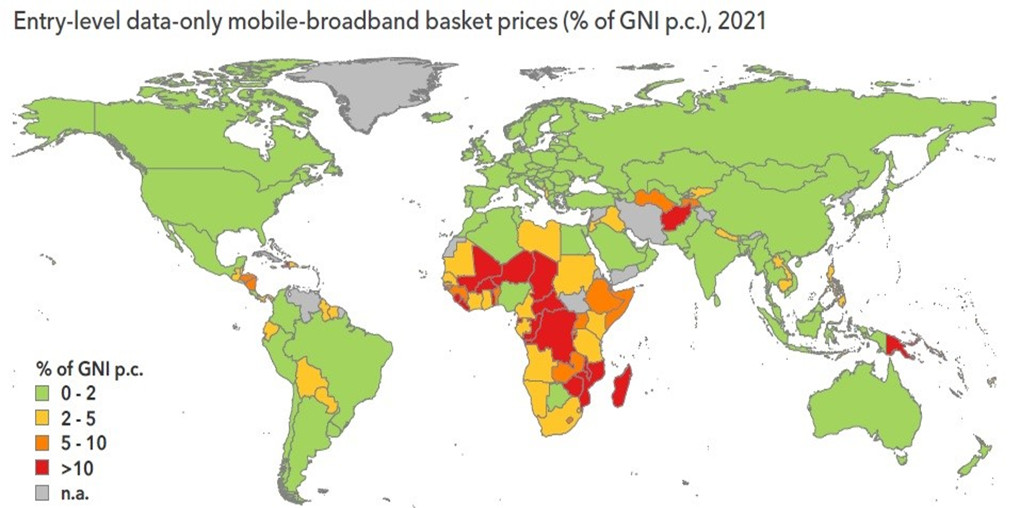 Source: UIT
Source: UIT
The cost of internet-enabled phones is another obstacle. In its study "To Luxury To Lifeline. Reducing the cost of mobile devices to reach universal internet access" covering 70 countries worldwide, the Alliance for Affordable Internet (A4AI) drew up a heat map revealing the markets where the price of a smartphone is most affordable. Access to computers is also expensive. Only 1% of the African population is connected to fixed broadband at home (35% in Europe, 23% in the USA, 17% in Asia-Pacific), out of the nearly 2.5 million km of fiber optic cable already deployed on the continent.
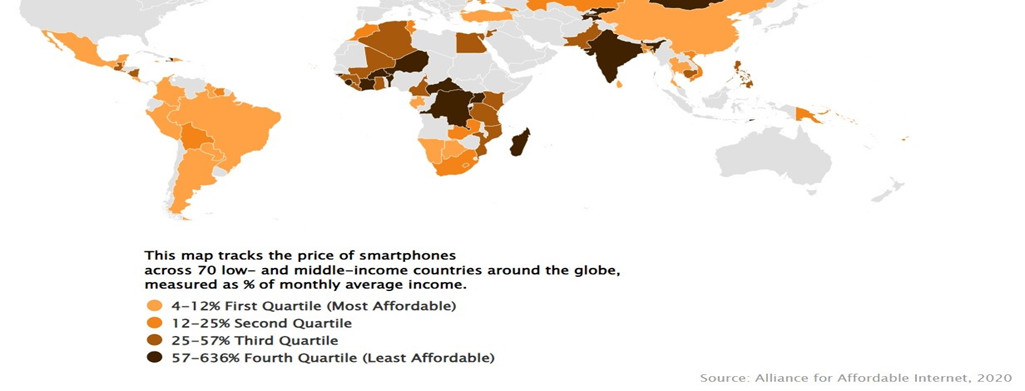 Source: Alliance for Affordable Internet
Source: Alliance for Affordable Internet
According to the ITU, the Internet is currently an undisputable catalyst for economic and social development. The UN agency states that improving mobile and fixed broadband penetration rates by 10% would add 2.5% and 1.5 respectively to gross domestic products (GDP).
Muriel Edjo
After enabling Nigerian startups to raise capital on the exchange, the NGX is going a step further with the federal government’s approval.
Nigerian authorities want local start-ups to be listed on the Nigerian Exchange Limited (NGX), the country's main stock exchange. This was stated by Bosun Tijani, Nigeria's Minister of Communications, Innovation and Digital Economy, at a technology event entitled "Invest in Africa's Future - Let's talk about exits" held last week in New York, on the sidelines of the United Nations General Assembly.
The aim is to stimulate the listing of startups on the NGX Technology Board index. "We want to prioritize the ability of our technology companies to export products and we are targeting Africa first and then eventually start selling to the rest of the world," Minister Tijani explained.
This decision is in line with the country’s plan to diversify its economy, therefore reducing its high dependence on oil revenues by capitalizing on its very buoyant and dynamic tech sector. According to Partech Africa, Nigerian startups captured $1.2 billion of the $6.5 billion raised in Africa in 2022. In 2021, they captured $1.8 billion of the $6 billion, against $307 million of the $1.43 billion in 2020 and $747 million of the $2 billion in 2019.
Apart from being the country whose startups attract the most funding in Africa, Nigeria also hosts four of the eight unicorns on the continent. Those unicorns are namely Chipper Cash, Flutterwave, Interswitch, and Opay. Flutterwave co-founder Olugbenga Agboola, who took part in the event in New York, explained that his company would bank on the project and capitalize on the opportunities offered to evolve and bring more value to its customers and investors.
"We will continue to do a lot of work that makes us able to attract local capital and the day tech start-ups come to the exchange, we are confident that there would be a very good audience of investors that would want to own a bit of their shares. This is what we at NGX are doing by removing all barriers for that to happen," says Temi Popoola, Chief Executive Officer of NGX.
Adoni Conrad Quenum
In 2021, Starlink began negotiations to get the necessary authorizations to provide its satellite internet services in certain African countries. Pursuing the same objective, the company is partnering with African companies with converging ambitions.
Pan-African broadband connectivity provider Paratus announced on Friday, September 22 that it had signed an agreement to distribute Starlink's broadband Internet services on the African continent.
Under the terms of the agreement, Paratus will supply Starlink to customers across the continent as and when licenses are granted to Starlink in Africa. For the time being, Starlink will be available from Paratus in Mozambique, Kenya, Rwanda, and Nigeria, before being extended to other countries.
"This agreement aligns perfectly with our vision of transforming Africa through exceptional digital infrastructure and customer service. It means we can offer industry sectors – such as land and offshore energy, mining, hospitality, education, healthcare, agriculture, and more – the reliable and constant connectivity they need to flourish, no matter how remote they are," said Martin Cox, Paratus Group Chief Commercial Officer.
For Starlink, the new agreement is part of its expansion strategy to bring satellite broadband Internet services to every corner of the globe, including remote and landlocked areas hardly accessible for mobile operators' terrestrial networks.
In this way, the partnership between Paratus and Starlink should help to strengthen competition in the African Internet market and promote digital inclusion. According to a 2022 report by the International Telecommunications Union (ITU), in 2021, 33% of Africans used the Internet, compared with 63% for the global average. These figures have risen sharply in 2022 with the arrival of new telecom operators and the construction of new infrastructures in several countries.
Samira Njoya
Electronic payment solutions provider Visa Inc. has officially inaugurated its new office in the Egyptian city of Cairo.
According to the company's press release, this further expansion demonstrates Visa’s commitment to supporting the company's financial institution and merchant clients, local government partners, investments, and local communities in ongoing efforts to drive the digitization of the payments landscape.
E-health platform "Expertise", which promotes digital health in Africa, and its partners recently issued a call for applications for the creation of a Committee of Experts in Digital Health for Africa (CEiSNA). The initiative aims to bring together digital health stakeholders to develop innovative strategies and solutions for the future of digital health in Africa.
Individuals, start-ups, companies, universities, and healthcare institutions involved in this sector are invited to submit applications, by November 9, 2023, at 23:59 GMT. To apply, they simply need to fill out this form.
The solution was co-funded by a Nigerian-born entrepreneur who spent the bulk of his professional career working for international IT firms.
WallX is a fintech solution developed by a Nigerian startup of the same name. It enables users, both individuals and corporate entities, to send and receive money, receive payments, and settle online transactions. The startup, based in Lekki in Lagos State and New York in the USA, was founded in 2020 by Richmond Ogigai and Subomi Jegunmah.
"I had seen firsthand the experiences of small business owners when it comes to payments and how their businesses eventually die out because they don’t have the basic tools or knowledge to build out their businesses. [...] Things like smart digital payment tools, record keeping, hiring, and sales management, are still very much done in a very manual way, and they end up running your business down," says Richmond Ogigai.
The solution features a mobile application accessible for Android and iOS devices. Once downloaded, users must create an account to access the various services it offers. Both individuals and companies can generate payment links as well as PIN codes to easily collect merchant payments or gift vouchers, pay electricity bills, buy airtime, or make monetary contributions such as participatory financing.
Since its launch, the Android version of the mobile application has already been downloaded more than a thousand times. WallX has been selected for the Spring 2023 cohort of New York accelerator Starta. It is also one of the 12 startups selected for the second cohort (2023) of the Fast Accelerator program supported by Microsoft.
Adoni Conrad Quenum
After launching two businesses that unfortunately failed, he turned to technology, offering a fintech solution that enables small and medium-sized businesses to manage their accounts and access financial services.
Emmanuel Emodek (photo) is a Ugandan entrepreneur and the co-founder and CEO of ChapChap, a startup that helps small and medium-sized businesses keep their accounts and access financial services.
After graduating from high school, he opted out of university to help his mother and brothers earn a steady income. For that purpose, he launched two successive businesses which unfortunately failed. Then he met one of his former school teachers, Monica Kiconco Asiimwe, who asked him to come up with an idea for a solution that would help entrepreneurs.
"Monica saw something in me. She told me that she knew I could think up some kind of solution that would help small business owners stay afloat," Emmanuel Emodek indicated in 2019.
Following his former teacher’s advice, in 2016, he launched ChapChap. His co-founders in that endeavor are Monica Kiconco Asiimwe and James Alituhikya, a software engineer and at the same time one of Monica’s former students. ChapChap is an app that enables entrepreneurs to manage their inventory, sales, expenses, and profits and also gives them access to loans, insurance, and markets.
Since its launch, ChapChap has enjoyed remarkable success. In Uganda, the company already offers its services to over 20,000 micro, small, and medium-sized enterprises. In 2019, its CEO was chosen from among eight entrepreneurs to receive the HRH The Prince of Wales Young Sustainability Entrepreneurs Prize awarded by Unilever and Cambridge University's Institute for Sustainability Leadership.
Before becoming an entrepreneur, Emmanuel Emodek worked as a cabin crew for Air Tanzania Company Ltd from 2005 to 2010. Between 2007 and 2012, he was an independent distributor for QNET Ltd, a lifestyle and wellness company that uses a direct sales business model to offer a wide selection of products.
Melchior Koba
MIIC provides entrepreneurs with an environment conducive to idea maturation and business development. Doing so contributes to economic and social transformation in Uganda.
Makerere Innovation and Incubation Centre (MIIC) is a startup and innovation incubation center based in Kampala, Uganda. Founded in 2010 by Dr. Peter Ngategize, an agricultural economist and private sector development expert, MIIC aims to support the development and growth of technology-based businesses and innovations in key sectors.
It offers entrepreneurs collaborative spaces, product and business development support, coaching, market access, and capital as well as access to incubation, acceleration, validation, and training programs.
Its flagship incubation program, The MIIC Startup Dealflow, is a 6-month program aimed at seed and early-stage technology entrepreneurs seeking support for product design and improvement, business growth, and market expansion.
MIIC also organizes events such as the Jumpstart Series, which enables local business leaders, industry experts, and alumni from its programs to share business development, management, and growth ideas with founders/entrepreneurs from the local ecosystem.
The incubator collaborates with partners such as Startup Uganda, VRC Group, Afrolynk, Startup Africa Roadtrip, AfriLabs, and other players in the entrepreneurial ecosystem. Since 2017, it has mentored over 50 startups and funded over 20 startups, helping create over 100 jobs.
The center focuses on the most pressing needs of the market and society to develop viable and sustainable solutions. MIIC's sectors of intervention include agriculture, education, finance, health, tourism, transport, software services, and energy.
Melchior Koba
To fulfill its digital transformation ambitions, the Chadian government is multiplying initiatives with key partners.
The Secretary General of the Ministry of Telecommunications and Digital Economy of Chad, Mahamat Saleh Ibrahim, and the Vice President and General Manager of Huawei CEMAC zone, Léo Lingyu Kong, signed a memorandum of understanding on Saturday, September 23 in Shanghai, on the sidelines of Huawei Connect 2023.
Under the terms of the agreement, Huawei is committed to becoming a key partner of the Chadian government and supporting it in its mission to build a favorable ecosystem for the emergence of digital talents in Chad.
"In the era of the digital economy, digital talent is key, and Huawei is committed to transferring and sharing ICT knowledge and skills, continuously improving digital competencies, and supporting the development of local digital economies and emerging industries," the ministry said in a note posted on social networks.
This initiative is part of the National ICT Modernization Project, financed by a concessional loan granted by the Chinese government to the Chadian government. In its first phase, which is still underway, the government benefited from the support of Huawei and other partners such as telecom operators Moov and Airtel.
Launched in 2020, the project is divided into several components, namely the construction of a national data center, the building of a 1,200 km fiber optic network crossing the country from south to east, a 50 km fiber optic loop around the city of N'Djamena, the modernization of the Sotel Tchad group's network through the construction of 200 2G/3G/4G sites, and the extension of subscriber capacity from 300,000 to 1,000,000.
All these initiatives underway in the country were reviewed in Shanghai by the Chadian delegation and Huawei vice-president Richard Jin. The second phase of the project was also discussed.
Samira Njoya
Last week, AI company Flapmax announced the twelve startups selected for its Fast Accelerator program focused on artificial intelligence. Supported by Microsoft, the program aims to strengthen and advance the African tech ecosystem. "Participation in the FAST Accelerator program will help these entrepreneurs capture growth opportunities and expand their market reach," explained Mame-Fatou Gueye, SME Program Manager, Microsoft Africa Transformation Office.
More...
She is an inspiration to all those who aspire to create a positive impact on society and the planet through technological innovation. Through her company, she is making Africa greener and cleaner.
Ugwem Eneyo (photo) is a Nigerian engineer, inventor, and entrepreneur. She is the CEO and co-founder of SHYFT Power Solutions, an energy technology company offering innovative Internet of Things (IoT) and software solutions to intelligently connect and manage distributed energy resources in emerging markets, particularly in Africa.
The Nigerian-born entrepreneur completed university studies in the United States, graduating in 2013 with a Bachelor's degree in Civil and Environmental Engineering from the University of Illinois at Urbana-Champaign. The following year, she entered Stanford University to complete a Master's degree and a Ph.D. in Civil and Environmental Engineering.
In 2016, she co-founded Solstice Energy Solutions, which was later rebranded SHYFT Power Solutions. The company enables users to reduce their energy costs, carbon footprint, and exposure to toxic gases.
SHYFT Power Solutions has experienced remarkable growth and garnered many prestigious awards. In its inaugural year, the company clinched the MIT Clean Energy Prize and emerged as a finalist in Demo Africa—an esteemed competition hosted by the African Technology Foundation (ATF) that recognizes innovative African enterprises.
Before launching SHYFT Power Solutions, Ugwem Eneyo worked as a trainee environmental and regulatory consultant for ExxonMobil in 2011. In 2013, she was appointed Environmental, Socio-Economic, and Regulatory Advisor for the same company. After completing her master's degree, in 2015, she completed an internship, again at ExxonMobil, but this time as an environmental engineer.
Ugwem Eneyo is recognized as one of the leading figures in the energy sector in Africa and worldwide. Named one of the Forbes 30 under 30 in the energy sector, she has been invited to speak at several prestigious events.
Melchior Koba
ZongoVation Hub is an NGO that leverages technologies to promote socioeconomic development in often marginalized and disadvantaged Zongo communities. Doing so helps create a dynamic and inclusive entrepreneurial ecosystem in Ghana.
ZongoVation Hub is a community technology innovation space dedicated to the development and growth of young entrepreneurs and startups in Ghana's Zongo communities. Founded in 2018, it helps young individuals transform their ideas into businesses by providing them with all the tools and networks they need.
Its founder and CEO, Mahmoud Jajah, is a serial entrepreneur and ecosystem builder whose vision is to transform Zongo communities into technology hubs across Africa.
ZongoVation Hub offers training programs in various technology-related fields, such as web development, graphic design, mobile application development, digital media, business development, and more. It also organizes charitable initiatives in the fields of health, education, leadership, and entrepreneurship.
Its main program is the Zongo Startup Program, which aims to identify, train, support, and finance early-stage entrepreneurs and startups from Zongo communities in Ghana. The program includes a three-month incubation period to validate prototypes, followed by a four-month acceleration phase to perfect products and business models before presenting companies to investors.
Since its creation, it has launched seven programs and trained over 100 women and men. It has supported the creation of more than four companies. It is currently leading an initiative called Zongo Tech, which aims to train and develop 100,000 entrepreneurs and technology experts from Zongo communities by 2030. To achieve that goal, it plans to set up centers in all 16 regions of Ghana and strengthen its network of local and international partners. For the moment, it can count on Ghana Tech Lab, AfriLabs, ISpace, Google, the British Council, Social Enterprise Ghana, and Digital Zongo, among others.
Melchior Koba
Sattelite internet provider Starlink has expressed its interest in conquering the African market by 2024. To date, the company has launched operations in five countries and is looking to do the same in Chad, with plans to extend its reach to 23 African markets.
The Chadian Electronic Communications and Posts Regulatory Authority (ARCEP) has issued a warning to individuals illegally marketing and operating Starlink terminals in the country. In a press release published on social networks on Friday, September 22, the telecoms regulator warns offenders of the penalties provided for by law in the event of continuation of the aforementioned activities.
Providing unauthorized electronic communication services or maintaining the services despite legal orders to suspend it is punishable by one to five years imprisonment and fines ranging from XAF100 million ($162,500) to XAF200 million or one of the two penalties, the release informs quoting Article 113 of Law No. 014/PR/2014 on electronic communications.
ARCEP's release comes as the Starlink network is increasingly used in Chad. On social networks, users are approving the new services, which they say are bridging the digital divide in the country by providing Internet access to underserved communities at an affordable cost.
For the telecoms regulator, the problem lies in the license that Starlink would need to obtain before launching operations in the country. Two days earlier, ARCEP held a consultation meeting on Starlink's application to become a Satellite Internet Service Provider (ISP) in Chad. A response is expected in the next few days.
In Chad, the legal use of Starlink should stimulate the digital sector and offer a high-speed Internet connection to a population that constantly complains about the poor quality and high costs of the Internet in the country.
Samira Njoya
True to its mission, which is to assist African countries “in their efforts to achieve economic development and social progress,” the AfDB is signing strategic partnerships to enable every member country to capitalize on the opportunities offered by the ongoing tech revolution.
On Thursday, September 21, the African Development Bank (AfDB) and American technology giant Google announced the signing of a letter of intent during the Global Africa Business Initiative at the UN General Assembly in New York. The aim is to harness emerging technologies, expand and improve technology infrastructures, and develop talent and skills to accelerate digital transformation on the continent.
"Our journey from a 2% telephony penetration in 1998 to today's era of 4G, 5G, and AI signifies immense progress. With 70% of sub-Saharan Africans under 30, our focus is on catalyzing businesses to create jobs and offer innovative solutions," says AfDB President Akinwumi Adesina (photo, center).
African countries are accelerating digital transformation with various programs and projects. They are multiplying partnerships to this end, and all sectors of activity are being positively impacted. The establishment of ecosystems and regulations to encourage the proliferation and emergence of startups is also at the heart of many governments' actions, fostering collaboration with global technology giants such as Google, Huawei, and Microsoft.
In collaboration with the AfDB, which has already injected more than $1.9 billion into various digital-related projects on the continent, the Mountain View firm will offer, among other things, “technical assistance to bolster entrepreneurs and small and medium-sized enterprises in digitizing their businesses, securing financing, mastering digital marketing, and advancing private sector development.”
Adoni Conrad Quenum





